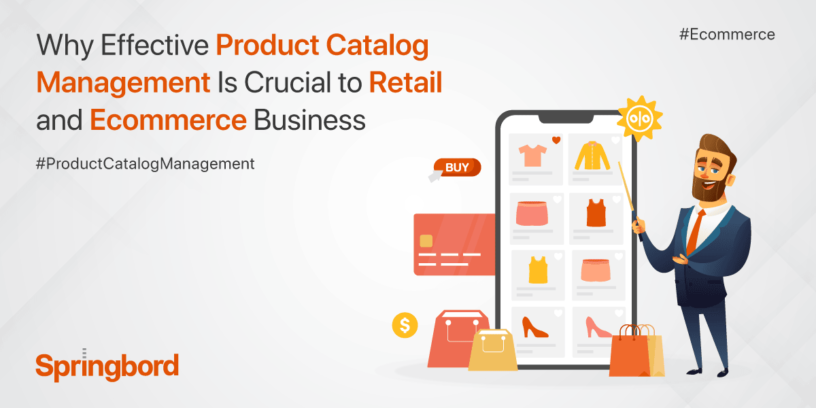 Read time 3 min
Read time 3 minIn today’s competitive digital environment, it’s challenging for retailers to maintain accurate, compelling product listings across all of their sales channels without product catalog management.
A product catalog management system is where information like product descriptions, pictures, availability, technical specs, shipping details, prices, etc. can be easily modified.
Core to any e-commerce platform is the ability to browse and purchase products.
Understanding the value of catalog management for E-commerce and Retail
The term “product catalog management” refers to the procedure of keeping all product information current, correct, and interesting across all channels of promotion and sales. Its value is twofold. To start, it will help your staff stay productive as you roll out new digital marketing and sales channels.
For another, it will give buyers more of what they need to know to make an informed decision about a product, including a better user experience.
A shopper’s final decision to make a purchase can be influenced by a well-organized and attractive digital product catalog that includes all the relevant information and media the shopper needs to make an informed choice. In a nutshell, a product catalog is useful for converting window shoppers.
Therefore, to boost your store’s credibility, you need to have well-managed product catalogs that make it easy to find the products you sell.
1. Enhancing the User’s Experience
Product catalog management ensures that a website’s products, shipping information, pricing, photos, reviews, links, etc. are all up-to-date and easily accessible to users.
If a user is browsing the site in search of a specific product, they should find similar information across all pages about that product. Instead of only listing features and benefits, product catalogs should be designed with the buyers wants in mind.
2. Enhanced Brand Recognition
Online stores should prioritize branding when designing their storefronts since this will help their products stand out from the competition and bring in more customers.
Users are more likely to think of the brand again when they are ready to purchase because of the website’s aesthetic, product catalogs, and robust user interface. Managing product catalogs is a critical function for e-commerce businesses to keep their reputations intact in the online shopping world.
3. Highest Conversion Rate
With the correct e-commerce product catalog management in place, online retailers can increase their conversion rates by having more in-context dialogues with their consumers and prospects.
When a firm has efficient product catalog management in place, its website visitors are better able to make educated purchasing decisions because they have access to all the information they need.
4. Drive Offline Revenue Generation
Many consumers now conduct their product research online before making their final purchase in a physical store, shopping mall, or freestanding retail location.
As a result, it is more important than ever for shops to furnish their online customers with all the facts they need before they make a purchase. Landing pages, websites, product pages, and microsites all provide information that can help customers make a more informed purchase decision.
5. Sales and Marketing Promotions
In contrast to brick-and-mortar locations, online marketplaces can more easily accommodate a wider range of promotional strategies.
Advertising new deals and referring friends is a breeze on e-commerce platforms. With the correct product and timing, you may persuade clients who are on the verge of leaving to stay.
To entice customers who are comfortable with digital technology, it is important to have a wide variety of products in-store and displayed attractively.
If you run your eCommerce product catalog efficiently, you may reduce the amount of work you have to do manually, fix any problems with quality or errors, meet any deadline, and save money. Having the right merchandising at the right time can help you rapidly develop and execute promotional programs, which in turn will attract customers.
Conclusion
The success of an online store depends on its ability to provide a hassle-free shopping experience for its customers. With any luck, this will lead to a decrease in abandoned carts and an increase in revenue. Consumers who have a positive shopping experience on a website are more likely to return for additional purchases.
The maintenance of a product catalog requires a prominent display of the website content that describes the products in question. By understanding their product’s unique selling proposition, retailers may make their goods a must-have for their target market.
You can expect amazing things for your company thanks to this framework. Consider reaching out to an expert if you feel this process is too complex or time-consuming, and you would like to expand your business.
At Springbord, we’ve got a team of experts who’ve done this sort of thing in the E-commerce industry and know how to get the job done well.




